
Reports of Forestry Research-Zpravy Lesnickeho Vyzkumu
Scope & Guideline
Fostering collaboration in the heart of forestry research.
Introduction
Aims and Scopes
- Forest Ecosystem Dynamics:
Research on the interactions within forest ecosystems, including species richness, disturbance regimes, and responses to climatic changes. - Silviculture and Forest Management:
Studies on silvicultural practices, including thinning, afforestation, and the impact of management strategies on forest health and productivity. - Soil and Nutrient Management:
Investigations into soil properties, nutrient cycling, and the effects of different tree species on soil chemistry and health. - Biodiversity and Conservation:
Research focusing on the conservation of forest biodiversity, including studies on invasive species, habitat restoration, and species interactions. - Climate Change Impacts:
Examination of how climate variability affects forest ecosystems, species distribution, and management practices. - Socio-Economic Aspects of Forestry:
Analysis of the economic implications of forestry practices, including ecosystem services valuation and the socio-economic importance of forests.
Trending and Emerging
- Climate Change Adaptation Strategies:
There is an increasing emphasis on adaptive management strategies that address the impacts of climate change on forest health, species composition, and ecosystem services. - Recreational Forest Ecosystem Services:
Research exploring the recreational and social benefits of forests is trending, underscoring the importance of integrating human well-being with forest management. - Technological Innovations in Forestry:
Emerging studies are focusing on the application of technology, such as remote sensing and genetic analysis, to improve forest management practices and biodiversity assessments. - Forest Soil Carbon Dynamics:
An increasing number of papers are investigating the role of forest soils in carbon storage and the implications for climate change mitigation efforts. - Transdisciplinary Approaches in Forestry:
There is a growing trend towards integrating diverse scientific disciplines and stakeholder perspectives in forestry research, enhancing the relevance and applicability of findings.
Declining or Waning
- Traditional Forest Products:
Research on conventional forest products, such as timber and non-timber forest products, has seen a decrease as the focus shifts toward ecosystem services and sustainability. - Invasive Species Management:
Although still relevant, the frequency of studies specifically targeting invasive species management has diminished, possibly due to a broader integration of this topic into general biodiversity and conservation research. - Historical Land Use Studies:
Papers focusing on historical land use practices in forestry have become less common, indicating a potential shift towards contemporary management practices and their immediate impacts.
Similar Journals

BOSQUE
Cultivating Insights for a Greener TomorrowBOSQUE, published by Universidad Austral de Chile, Facultad de Ciencias Forestales, stands as a pivotal platform for advancing the field of forestry and related environmental sciences. With an ISSN of 0717-9200, this journal has been committed to disseminating original research, reviews, and case studies essential for understanding forest ecosystems and management practices since its inception in 2006. As of 2023, it holds a Q3 ranking in the forestry category, showcasing a significant yet developing influence in the broader academic landscape, evidenced by its Scopus ranking placing it at the 12th percentile in Agricultural and Biological Sciences - Forestry. While boasting a diverse range of articles, BOSQUE promotes open access to a growing community of researchers, professionals, and students eager to contribute to sustainable forest management and conservation efforts. The journal continues to foster critical dialogue and innovation, making it an invaluable resource for those dedicated to enhancing forest sciences.

FORESTRY
Elevating forestry management through peer-reviewed excellence.FORESTRY is a prestigious journal dedicated to the advancing knowledge and innovative practices in the field of forestry, published by Oxford University Press. Established in 1927, it encompasses a rich history of scholarly contributions and has evolved to maintain its relevance, addressing contemporary issues and research in forestry and related disciplines. With an impressive Q1 ranking in the category of Forestry, this journal holds a notable position within the Scopus rankings, being placed 20th out of 174 in the Agricultural and Biological Sciences domain, highlighting its significant impact with an 88th percentile standing. Researchers, professionals, and students can access critical insights into forestry management, ecology, and policy, facilitating informed decision-making and fostering sustainable practices. While Open Access options are currently not available, the journal's rigorous peer-review process ensures the publication of high-quality research that contributes both to academic advancement and practical applications in forestry worldwide. The comprehensive coverage from 1927 to 2024 makes FORESTRY an invaluable resource for anyone invested in enhancing the field of forestry.
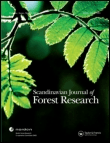
SCANDINAVIAN JOURNAL OF FOREST RESEARCH
Exploring Forest Ecosystems for a Greener TomorrowSCANDINAVIAN JOURNAL OF FOREST RESEARCH, published by Taylor & Francis AS, is a leading peer-reviewed journal dedicated to advancing knowledge in the field of forestry. With an impressive ranking of Q2 in the Forestry category for 2023 and a Scopus rank of #57 among 174 journals in Agricultural and Biological Sciences, this journal serves as a vital resource for researchers, professionals, and students. Its broad scope encompasses various aspects of forest research, including ecology, management, and conservation, making it indispensable for those involved in the sustainable stewardship of forest resources. The journal is available through subscription, ensuring high-quality research dissemination while maintaining rigorous academic standards. With continuous publication from 1986 to the current year, it stands as a significant contributor to the global conversation on forest science, highlighting the importance of forest ecosystems in ecological and socio-economic contexts.
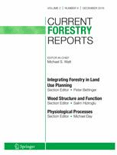
Current Forestry Reports
Navigating the future of forestry with groundbreaking findings.Current Forestry Reports, published by Springer International Publishing AG, stands at the forefront of forestry and ecological research, boasting an impressive array of quartile rankings in 2023 such as Q1 in Ecology and Forestry. With an ISSN of 2198-6436, this journal has emerged as a pivotal platform for disseminating innovative research findings and insights critical to the sustainable management of forest ecosystems. Operating out of Switzerland, it covers a broad scope that spans from ecological theory to practical forestry applications and landscape conservation. Notably, it ranks #3 out of 174 in Agricultural and Biological Sciences: Forestry and #4 out of 211 in Environmental Science: Nature and Landscape Conservation, reflecting its high impact and relevance in the field, placing it in the top percentiles in multiple categories. This open-access journal endeavors to provide a comprehensive understanding of contemporary issues, trends, and methodologies in forestry and related disciplines, making it an indispensable resource for researchers, practitioners, and students who are dedicated to advancing knowledge and practices in forest science.
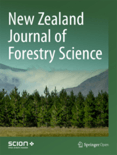
NEW ZEALAND JOURNAL OF FORESTRY SCIENCE
Innovating Solutions for Forest ConservationNEW ZEALAND JOURNAL OF FORESTRY SCIENCE (ISSN: 0048-0134; E-ISSN: 1179-5395), published by SCION, stands as a pivotal resource for researchers, professionals, and students dedicated to the fields of forestry, ecology, and plant sciences. With a strong commitment to open access since 2013, the journal promotes the dissemination of high-quality research and innovative practices within these disciplines, thereby fostering a greater understanding of the natural environment. The journal has achieved commendable rankings, being placed in the Q2 category in Ecology, Forestry, and Plant Science, reflecting its significant contribution to advancing knowledge and best practices in these areas. Based in Switzerland and published by SCION, a trusted name in forest research, the journal plays an integral role in shaping the dialogue around sustainable forest management and ecological conservation. As such, it serves as an essential platform for scholarly discourse and a valuable resource for anyone engaged in forestry and environmental studies.

Forest Ecosystems
Championing open access to forest research.Forest Ecosystems is a prestigious open access journal published by KEAI PUBLISHING LTD, dedicated to advancing knowledge in the fields of forestry, ecology, and conservation. Established in 2014 and located in Beijing, China, this journal has rapidly gained prominence, achieving Q1 status in multiple categories, including Ecology, Evolution, Behavior and Systematics, and Forestry in 2023. With an impressive rank of 19 out of 174 in the Scopus category of Agricultural and Biological Sciences - Forestry, it stands in the 89th percentile, reflecting its influential contributions to the field. The journal fosters scholarly discourse and disseminates innovative research aimed at understanding forest ecosystems and their vital role in our environment. Offering a robust platform for researchers, professionals, and students, Forest Ecosystems ensures accessibility through its open access format, enabling a wider audience to engage with and benefit from cutting-edge research dedicated to the stewardship of forest resources.

JOURNAL OF TROPICAL FOREST SCIENCE
Bridging Research and Practice in Tropical ForestryThe JOURNAL OF TROPICAL FOREST SCIENCE, published by the FOREST RESEARCH INST MALAYSIA, serves as a vital platform for disseminating research focused on tropical forestry. Since its inception in 1988 and transitioning to its current form in 1993, this journal has established itself within the academic community, currently holding a commendable Q3 ranking in the Forestry category, as per the 2023 metrics. With an ISSN of 0128-1283 and E-ISSN 2521-9847, it provides crucial insights into the ecological, economic, and social aspects of tropical forest management and conservation, making it an indispensable resource for researchers, practitioners, and students alike. Although it does not operate under an open-access model, the journal emphasizes quality and relevance in its publications, contributing significantly to the ongoing discourse in agricultural and biological sciences with a Scopus rank of #89 out of 174 and a 49th percentile position.
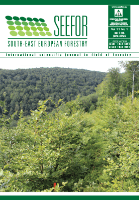
SEEFOR-South-East European Forestry
Exploring the dynamics of forestry in a changing environment.SEEFOR-South-East European Forestry is a premier open-access journal dedicated to advancing knowledge in the field of forestry and environmental science. Published by the CROATIAN FOREST RESEARCH INSTITUTE, this journal has been operational since 2010, providing a platform for research that focuses on the unique forestry dynamics of the South-East European region. With an ISSN of 1847-6481 and an E-ISSN of 1849-0891, SEEFOR is recognized for its commitment to disseminating high-quality research that addresses critical issues in forestry management, conservation, and sustainable development. The journal is indexed in Scopus, placing it within the third quartile (Q3) of forestry journals, reflecting its significance within the academic community. SEEFOR aims to connect researchers, practitioners, and policymakers, fostering collaboration and innovation in fostering sustainable forestry practices in Croatia and beyond. Submissions are welcome in a range of areas including forest ecology, policy development, and socio-economic impacts, making it an invaluable resource for professionals and students alike.
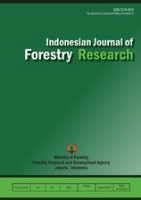
Indonesian Journal of Forestry Research
Connecting knowledge to practice in sustainable forestry.The Indonesian Journal of Forestry Research is a distinguished, peer-reviewed academic journal published by the Ministry of Environment & Forestry of Indonesia. With an ISSN of 2355-7079 and E-ISSN 2406-8195, this journal has been an Open Access platform since 2014, fostering international collaboration and knowledge sharing in the fields of ecology and forestry. As of 2023, the journal holds a respectable Q3 category in both Ecology and Forestry, reflecting its contribution to the science community. It ranks #99/174 in Forestry and #305/461 in Ecology in Scopus, indicating its growing influence in the respective fields. Aimed at researchers, professionals, and students, the Indonesian Journal of Forestry Research provides vital insights and findings, supporting sustainable forestry practices and environmental management in Indonesia and beyond. With an emphasis on innovative methodologies and applied research, this journal stands as a pivotal resource for those dedicated to advancing forestry science and ecological research.
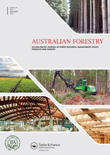
AUSTRALIAN FORESTRY
Advancing Sustainable Solutions in ForestryAustralian Forestry is an esteemed journal dedicated to advancing knowledge in the field of forestry and related environmental science. Published by Taylor & Francis Australia, this journal plays a pivotal role in disseminating high-quality research that spans various aspects of forestry, including sustainable management, conservation practices, and policy analysis. With an impact factor reflecting its significance in the academic community and a Scopus rank of #44 out of 174 in the category of Agricultural and Biological Sciences, Australian Forestry proudly holds a Q2 ranking in its field as of 2023. The journal has maintained a continuous publication record since its inception in 1936, with a commitment to addressing contemporary challenges within forestry. Researchers, professionals, and students alike are invited to engage with this vital resource that fosters insightful dialogue, innovative solutions, and a deeper understanding of forestry science.